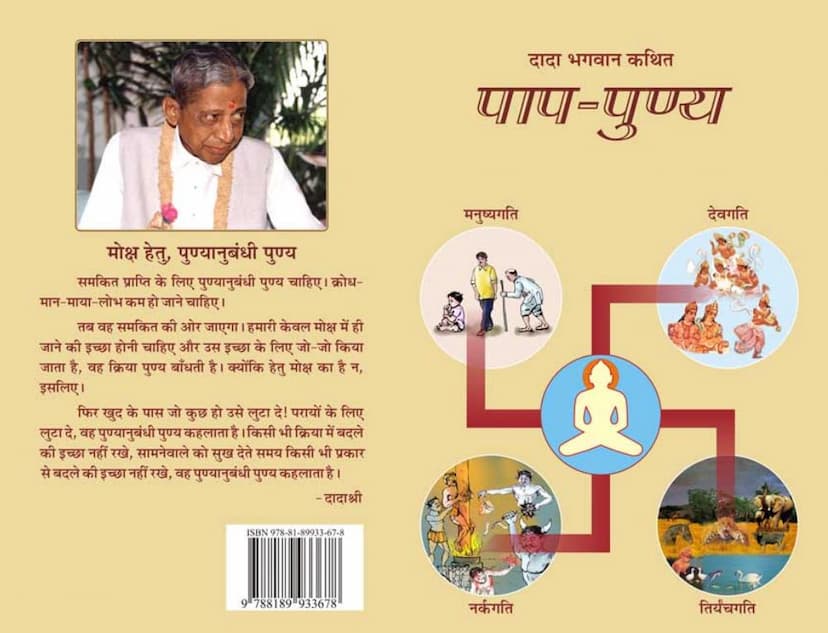Pap Punya
Added to library: September 2, 2025

Summary
This document is a summary of the Jain text titled "Pap Punya" (Sin and Merit) by Dada Bhagwan, published by Mahavideh Foundation. The book explores the concepts of sin and merit from a Jain spiritual perspective, as expounded by Dada Bhagwan.
Here's a breakdown of the key themes and teachings presented in the document:
Core Concepts:
- Definition of Sin and Merit: The fundamental teaching is that causing happiness to others creates merit (punya), and causing suffering to others creates sin (pap). This is presented as a simple and direct definition that encompasses the essence of righteous and unrighteous conduct.
- The Law of Karma: The book emphasizes that the world operates according to the results of one's own karma (punya and pap). There is no external force or God controlling the world; rather, it's the consequence of one's actions. This means individuals are entirely responsible for their lives and experiences.
- The Nature of Happiness and Suffering: Happiness arises from acts of merit, and suffering arises from acts of sin. This is presented as a credit-debit system in the cosmic accounts.
- Relativity of Sin and Merit: While the concepts of sin and merit are important for navigating worldly life and progressing towards spiritual goals, they are considered part of the relative truth. The ultimate goal, Moksha (liberation), lies beyond both sin and merit.
- The Role of Intention (Bhav): The intention behind an action is crucial. Actions performed with the desire for worldly outcomes or with ego will bind karma, even if they appear outwardly virtuous.
Types of Merit (Punya):
The book elaborates on different categories of merit:
- Punya (Merit in general): Actions that lead to happiness for others, creating positive karma.
- Punyānu bandhi punya (Merit that leads to further merit): This is the most significant type of merit for spiritual progress. It is characterized by:
- Desire for Moksha: The primary intention is liberation.
- Reduced Kasha (anger, pride, deceit, greed): One's negative emotions should be diminished.
- Generosity: Giving away what one possesses for the benefit of others.
- Absence of Desire for Return: Performing actions without expecting any reward or reciprocation.
- Papānu bandhi punya (Merit that leads to sin): This is merit that, due to underlying selfish intentions or attachments, leads to further worldly entanglement and eventual sin. Examples include acts of charity performed for name or fame, or wealth acquired through questionable means. This type of merit provides temporary worldly comforts but doesn't lead to true liberation.
- Punya (general): This type of merit leads to material pleasures and is considered relative. It helps in progressing towards spiritual goals but is not the ultimate solution.
Types of Sin (Pap):
- Pap (Sin in general): Actions that cause suffering to others.
- Papānu bandhi pap (Sin that leads to further sin): Actions that cause suffering and reinforce negative tendencies.
- Punyānu bandhi pap (Sin that leads to merit): This is an interesting concept where, despite performing actions that cause suffering, there is an underlying intention or awareness that leads to a potential for merit or spiritual understanding. For instance, a farmer who has to kill insects for their livelihood might still have a remorseful heart or pray for their well-being.
Key Teachings on Practice and Liberation:
- The "Akram Marg" (Un-sequential Path): Dada Bhagwan is presented as a Gnani Purush (Self-realized soul) who can grant Self-Knowledge and liberation in a direct, non-sequential manner. This is contrasted with the sequential path which involves gradual spiritual progression through various practices over many lifetimes.
- Importance of Self-Knowledge: The ultimate liberation (Moksha) is achieved through Self-Knowledge, by realizing the true nature of the Self (Soul).
- Pratikraman (Self-Correction): If one inadvertently causes harm or sin, immediate pratikraman is advised. This involves heartfelt repentance, asking forgiveness from the Self within the other person, and a firm resolve not to repeat the mistake. This process helps in mitigating the effects of past karma.
- The Role of the Gnani Purush: Meeting a Gnani Purush is presented as a result of punyānu bandhi punya. The Gnani can help in washing away sins and facilitating the realization of the Self, leading to liberation.
- The Goal of Moksha: The ultimate aim is to transcend both sin and merit, and the cycle of birth and death, to attain liberation.
- The Power of "Dadashri's Name": The text suggests that repeatedly uttering the name of Dada Bhagwan or remembering Him can protect one from the effects of sin.
Metaphors and Analogies:
- Credit and Debit: Sin and merit are compared to credit and debit in an account.
- Ice: Merit that leads to worldly pleasures is compared to ice that melts away.
- Seeds: Actions are like seeds that bear fruits later.
- Lawyer: The Gnani acts as a lawyer who can argue and clear one's karmic account.
- Lift vs. Stairs: The Akram Marg is like a lift, while the gradual path is like climbing stairs.
Practical Guidance:
- Avoid causing harm to any living being.
- Practice generosity and selflessness.
- Cultivate a desire for Moksha.
- Engage in pratikraman whenever a mistake is made.
- Seek the company of a Gnani Purush.
In essence, the book "Pap Punya" by Dada Bhagwan offers a profound yet practical understanding of spiritual life, emphasizing the importance of pure intentions, selfless actions, and the ultimate goal of Self-realization and liberation from the cycle of karma.